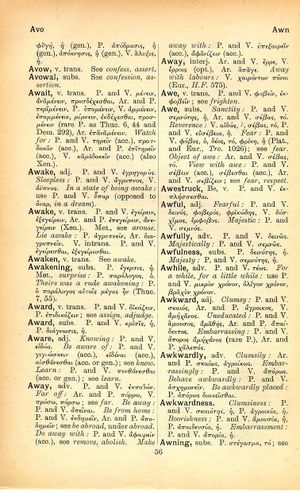awake: Difference between revisions
From LSJ
(CSV3) |
mNo edit summary |
||
| Line 4: | Line 4: | ||
P. and V. ἐγρηγορώς. | P. and V. ἐγρηγορώς. | ||
[[sleepless]]: P. and V. [[ἄγρυπνος]], V. [[ἄϋπνος]]. | |||
[[in a state of being awake]]: use P. and V. [[ὕπαρ]] (opposed to [[ὄναρ]], [[in a dream]]). | |||
'''v. trans.''' | '''v. trans.''' | ||
| Line 12: | Line 12: | ||
P. and V. ἐγείρειν, ἐξεγειρειν, Ar. and P. ἐπεγείρεις ἀνεγείρειν (Xen.). Met., see [[arouse]]. | P. and V. ἐγείρειν, ἐξεγειρειν, Ar. and P. ἐπεγείρεις ἀνεγείρειν (Xen.). Met., see [[arouse]]. | ||
[[lie awake]]: P. ἀγρυπνεῖν, Ar. διαγρυπνεῖν. V. intrans. P. and V. ἐγείρεσθαι, ἐξεγειρεσθαι. | |||
}} | }} | ||
Revision as of 12:43, 25 September 2019
English > Greek (Woodhouse)
adj.
P. and V. ἐγρηγορώς.
sleepless: P. and V. ἄγρυπνος, V. ἄϋπνος.
in a state of being awake: use P. and V. ὕπαρ (opposed to ὄναρ, in a dream).
v. trans.
P. and V. ἐγείρειν, ἐξεγειρειν, Ar. and P. ἐπεγείρεις ἀνεγείρειν (Xen.). Met., see arouse.
lie awake: P. ἀγρυπνεῖν, Ar. διαγρυπνεῖν. V. intrans. P. and V. ἐγείρεσθαι, ἐξεγειρεσθαι.

